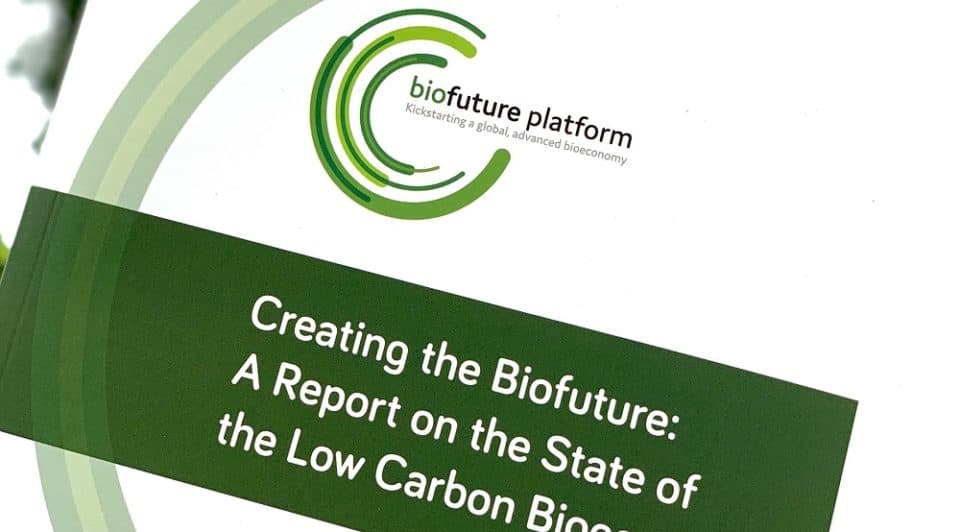A landmark new multi-country report launched today states that the world’s greenhouse gas reduction goals cannot be met without greater use of biofuels and bioproducts, and reveals the four largest barriers currently impeding further progress.
The report, Creating the Biofuture: A Report on the State of the Low Carbon Bioeconomy, affirms – in line with models and scenarios by the International Energy Agency (IEA), the International Renewable Energy Agency (IRENA), and the Intergovernmental Panel on Climate Change (IPCC) – that biofuels and bioproducts must play an integral role in the global energy transition, in tandem with other complementary mitigation efforts across all sectors. The report identifies key barriers as:
• High levels of perceived risk affecting the availability of financial resources for commercial-scale production, holding back necessary research, development and deployment.
• Lack of competitiveness for biofuels and other bioproducts relative to fossil fuel-based alternatives in many markets, taking into account fossil fuels subsidies and the comparative cost reductions achieved in a mature industry.
• Unfavourable policy frameworks that do not effectively coordinate the competing needs of the agricultural economy and food system, a secure and clean energy supply, and the protection of the natural environment.
• Insufficient, unreliable or expensive supplies of sustainably-sourced feedstock to use in the production of biofuels and other bioproducts.
“The report’s key lesson is that a package of well-informed, well-designed policies combining market and innovation support is paramount to sustainably producing biofuels, bioenergy and bioproducts at the scale we need”, said the Minister of Environment of Brazil, Edson Duarte. “This is an important milestone for our countries to work towards specific targets and action plans for the low carbon bioeconomy, as set out in the Biofuture Vision Declaration we put forth one year ago in Bonn”.
The report shows the scale of the challenge ahead and adds to a growing international consensus on the importance of bioenergy. A recent major report from the IEA, Renewables 2018, has called attention to the need to put bioenergy at the forefront of the global energy debate.
“Modern bioenergy is the overlooked giant of the renewable energy field,” said Dr Fatih Birol, the IEA’s Executive Director. “Its share in the world’s total renewables consumption is about 50% today – as much as hydro, wind, solar and all other renewables combined. We expect modern bioenergy will continue to lead the field, and has huge prospects for further growth. But smart policies and rigorous sustainability regulations will be essential to meet its full potential.”
The Creating the Biofuture report was commissioned by the Biofuture Platform – a government-led, multi-stakeholder initiative created to support the development of the sustainable, low carbon bioeconomy. It is based on insights and data from 19 countries and the European Commission, collaborating as members of the Biofuture Platform coalition and the Mission Innovation Sustainable Biofuel Innovation Challenge multilateral initiative.
“Bioenergy is a great way of balancing variable electricity production, mainly wind and solar”, said Kimmo Tiilikainen, Minister of Environment, Energy and Housing of Finland, one of the participating countries along with Brazil, China, France, India, the UK, and the US, among others. “However, bioenergy’s role in the heating and transport sectors is even more important, and I would say, crucial. Of course, electrifying the transport sector is a major trend, but with biofuels, we can achieve CO2 reductions quickly and with the current transport fleet”.
The original technical draft of the report was prepared by the Carbon Trust and Way Carbon consultancies, submitted for review by the participating governments, agencies, and partners, and published by the Government of Brazil in its capacity as the Biofuture Platform Interim Facilitator (a role similar to a Secretariat for the initiative).
According to the report launched today, around 130 billion litres of biofuel were produced annually in 2016, in a market worth approximately US$170 billion annually, mostly from sales of first-generation ethanol and biodiesel. Global biofuel output must rise to more than 200 billion litres annually by 2025 and more than 1100 billion litres annually by 2050 to be in line with long-term climate change mitigation scenarios developed by the IEA and the International Renewable Energy Agency (IRENA). Second and third generation biofuels are emerging but must grow dramatically if Biofuture Platform targets are to be met. These can be made from inputs such as non-food crops, agricultural or industrial waste and algae, although much of the technology is still evolving and hence not yet commercially deployed at large scale.
As well as outlining barriers, the report provides individual country profiles across existing markets for the bioeconomy and recommends key interventions for support.
To overcome barriers and accelerate the deployment of biofuels and other bioproducts, the report recommends countries establish clear goals and map potential pathways in order to create and deploy a comprehensive package of interventions, including: technology and innovation support; policies to support market demand and incentives, tied to sustainability measures and carbon lifecycle assessments; and strong financial instruments designed to enable the development of the bioeconomy. According to the report, solid international collaboration and stakeholder engagement will be key to help countries achieve these objectives.
IEA Designated to Become Biofuture Platform’s Facilitator
The Biofuture Platform also announced today that the IEA was designated to assume the role of Facilitator, following the Government of Brazil’s interim tenure. This development comes as part of a major governance overhaul to reinforce the Platform´s position as a key driver of international collaboration to overcome barriers to growth and accelerate the deployment of a sustainable low carbon bioeconomy.
With these internal governance changes, the Biofuture Platform expects to improve its position to drive the reinforced international collaboration called for in its Vision Declaration and in the Creating the Biofuture report, mobilizing governments, industry, academia, and related international initiatives, agencies and organizations.
“IEA’s own vision for this sector has already been fully aligned with the Biofuture Platform’s goals on the low carbon bioeconomy since its launch”, said Dr. Fatih Birol, IEA’s Executive Director. “I expect this closer collaboration to increase the reach and impact of our work to the benefit of IEA member countries, Biofuture Platform countries, and energy transitions around the world”.

